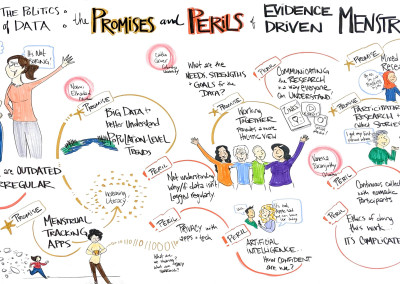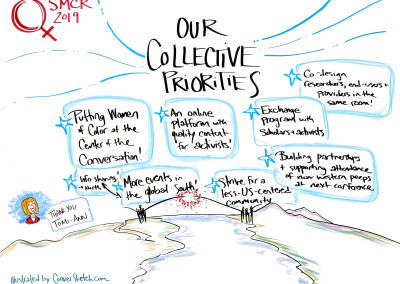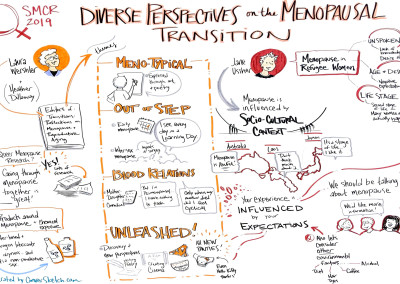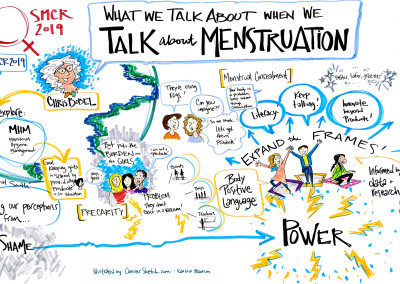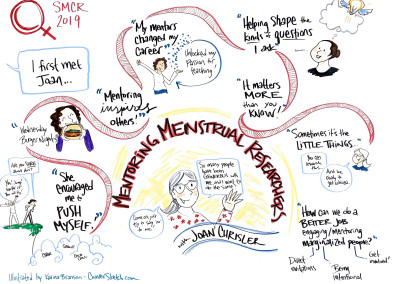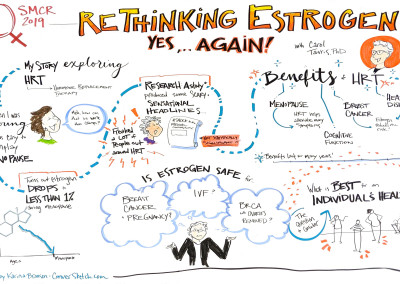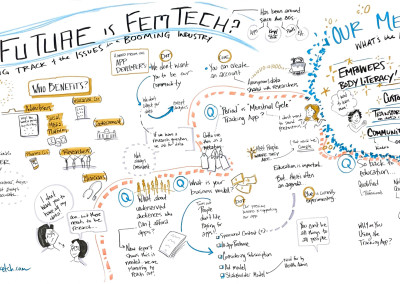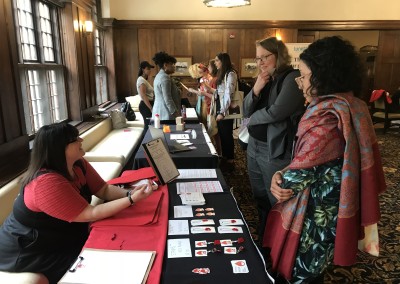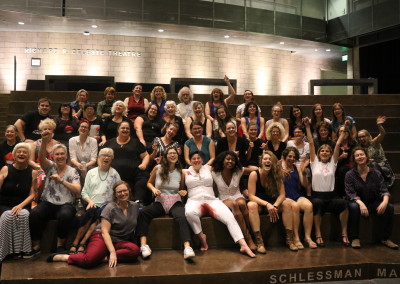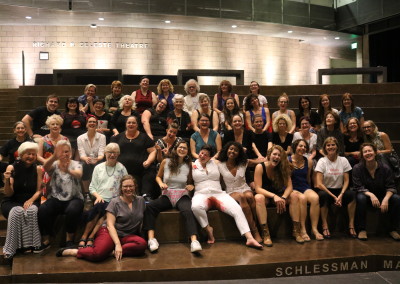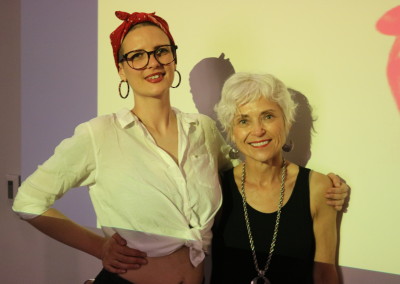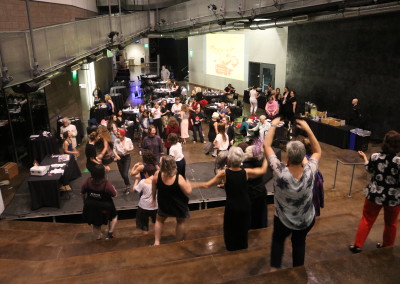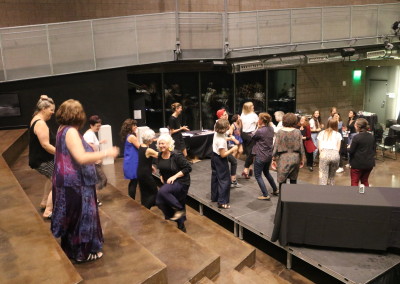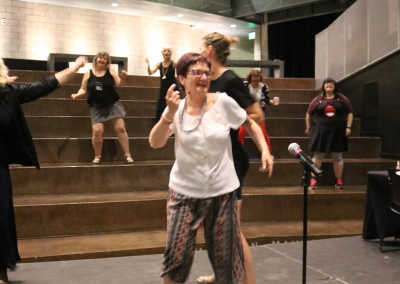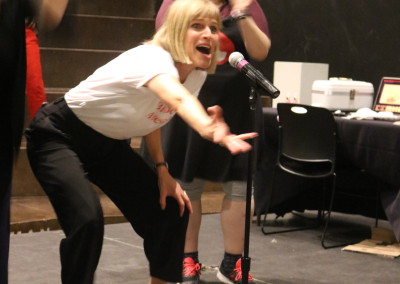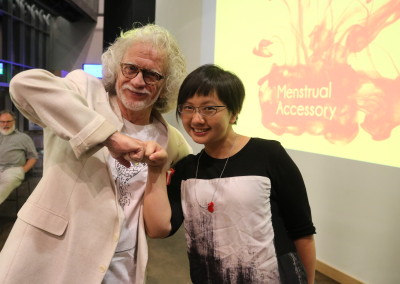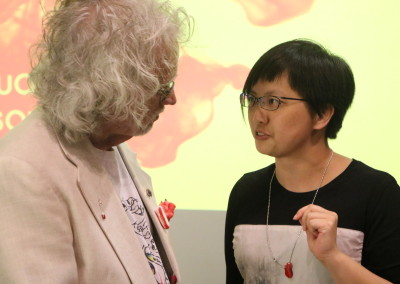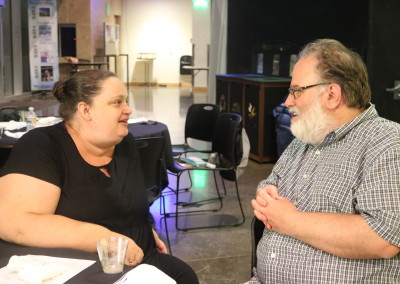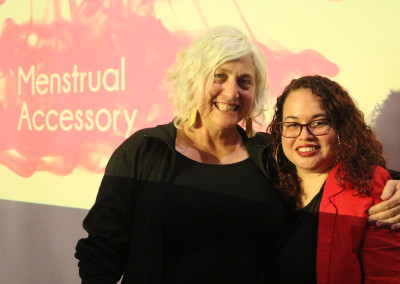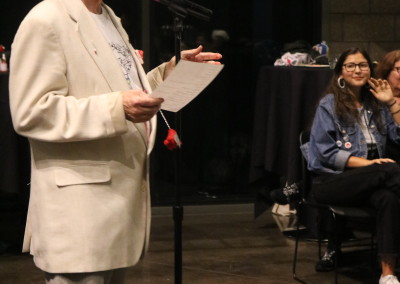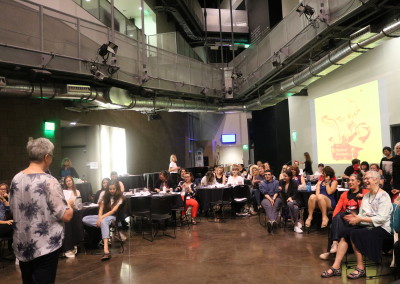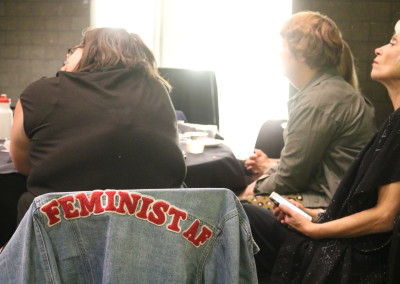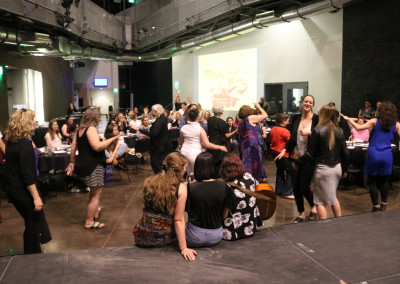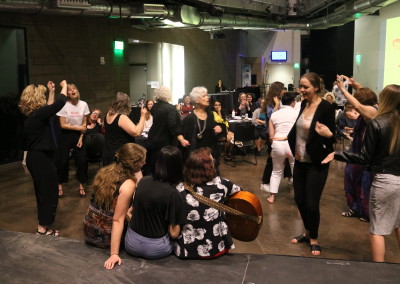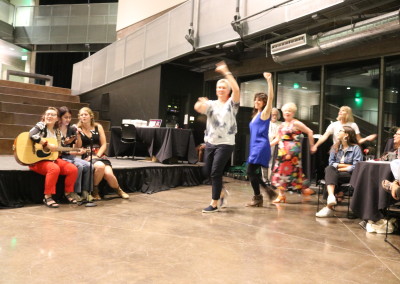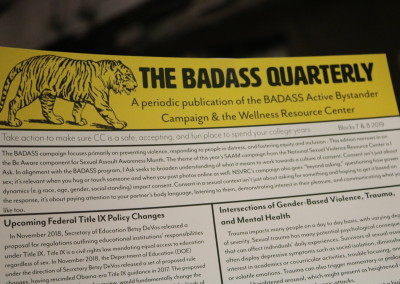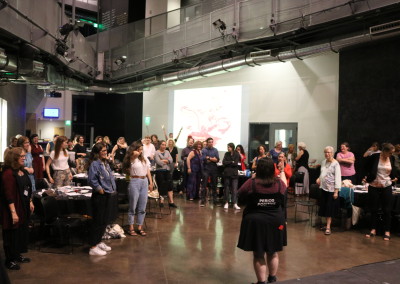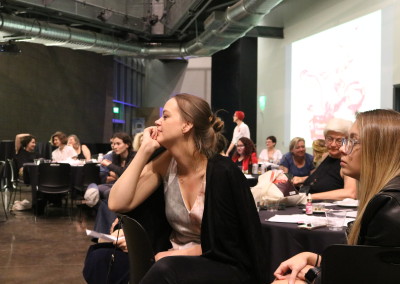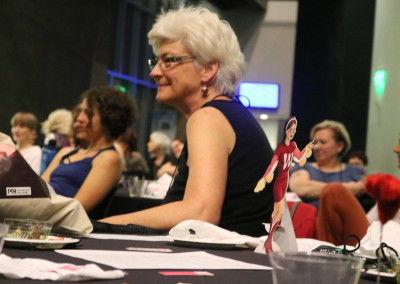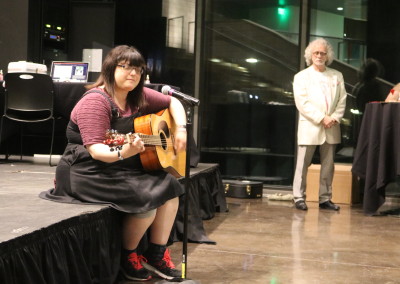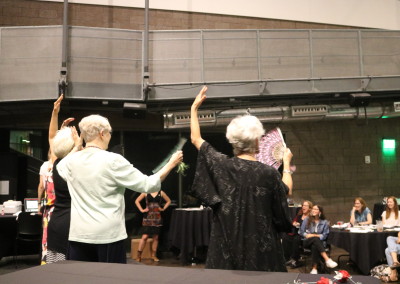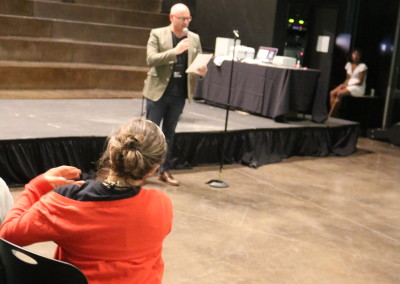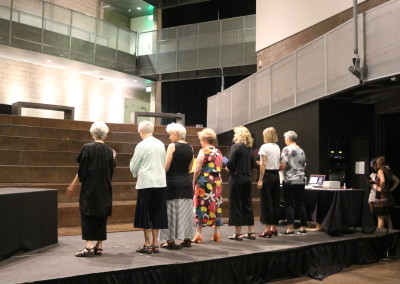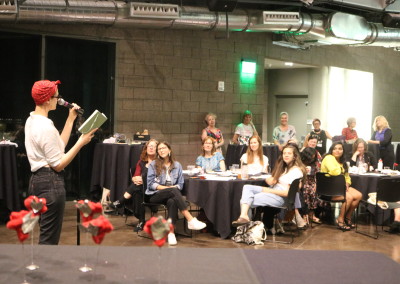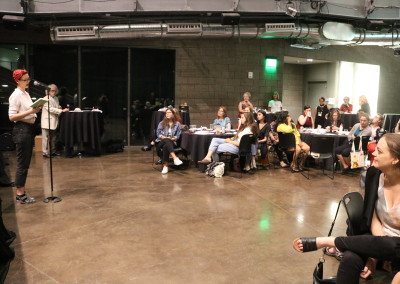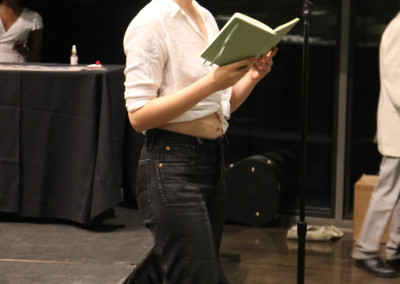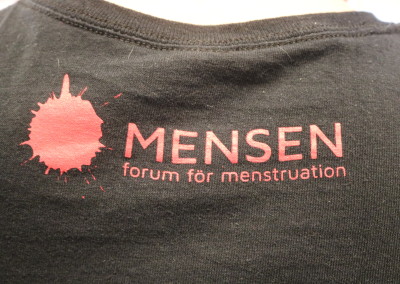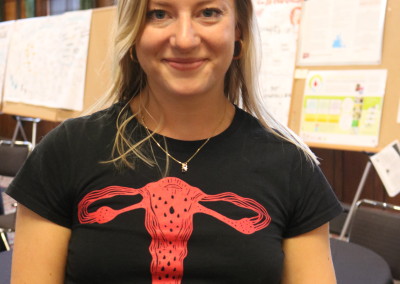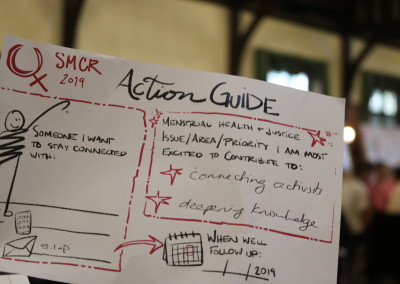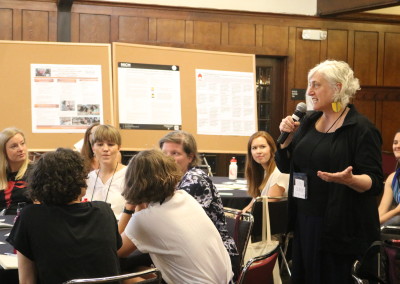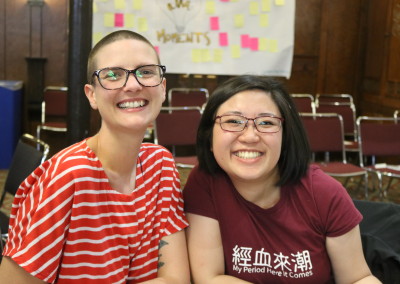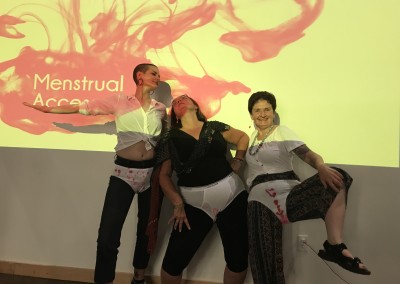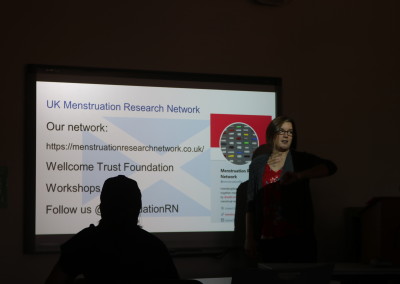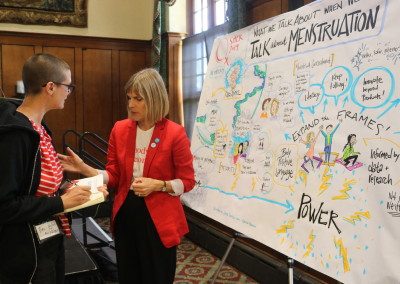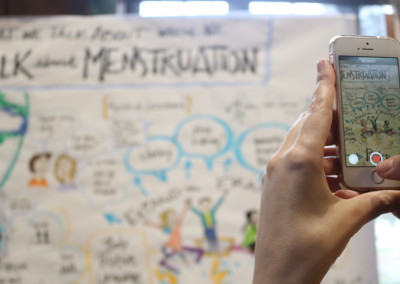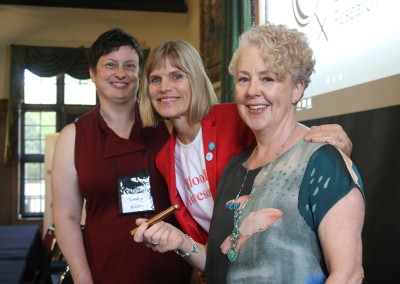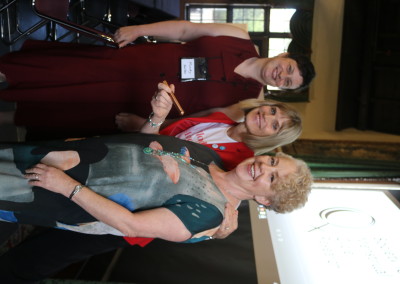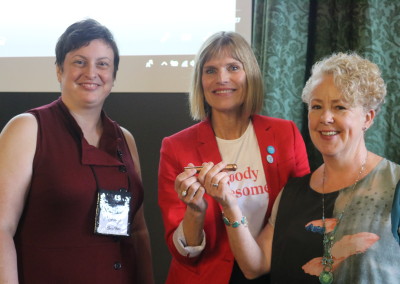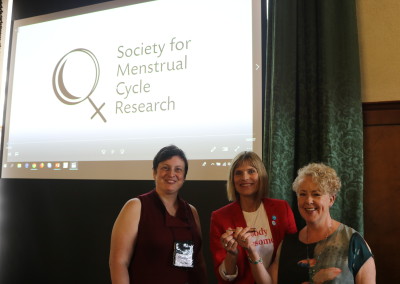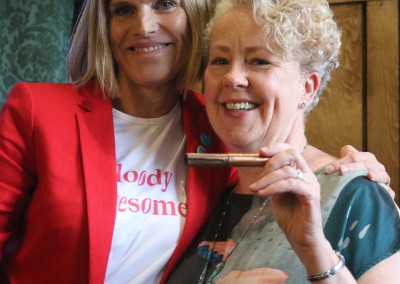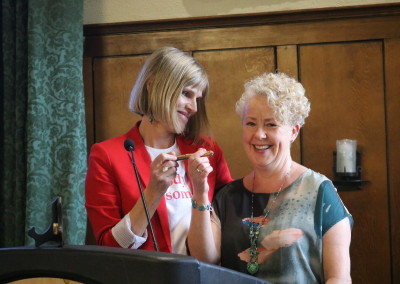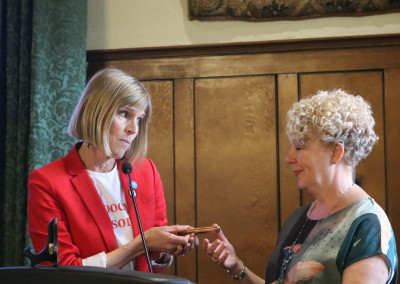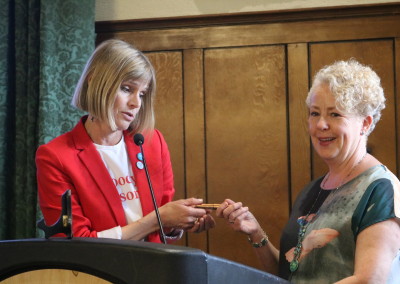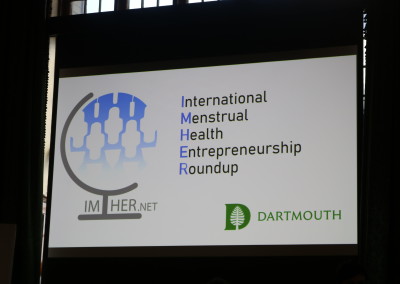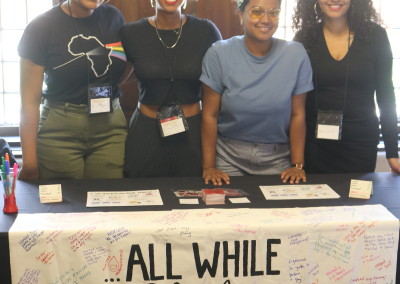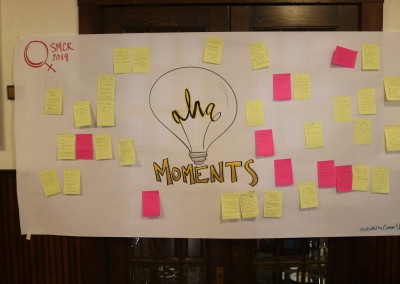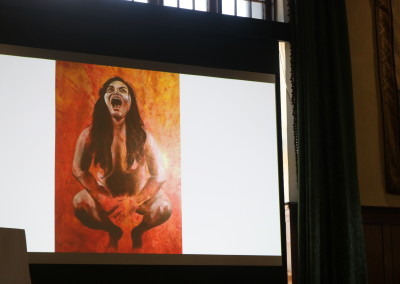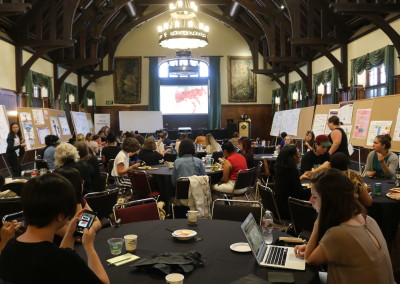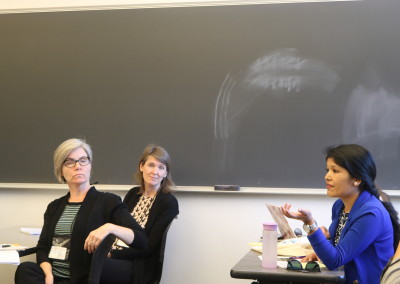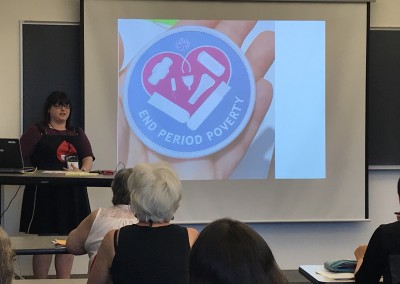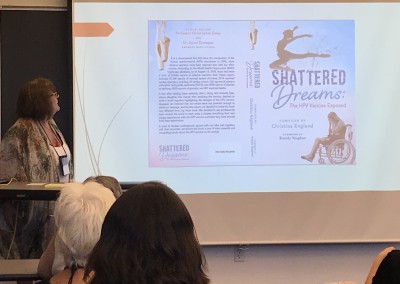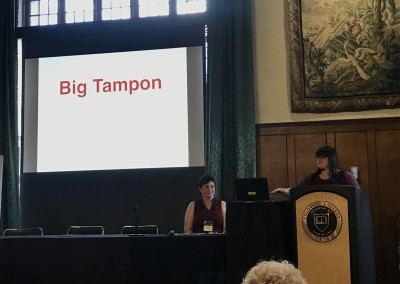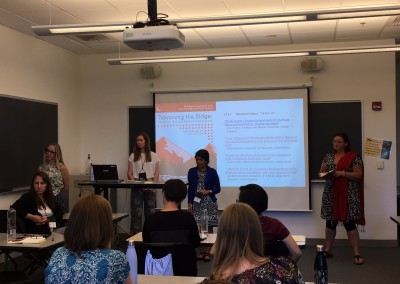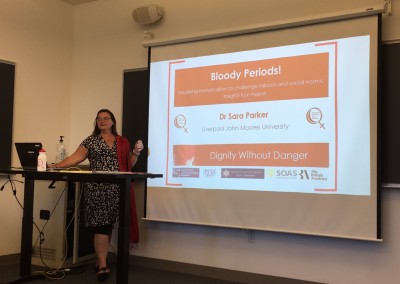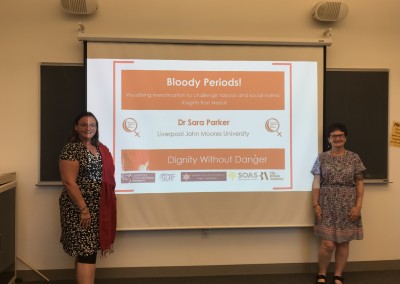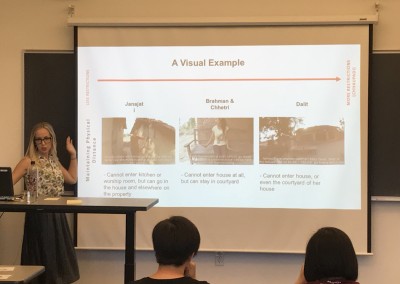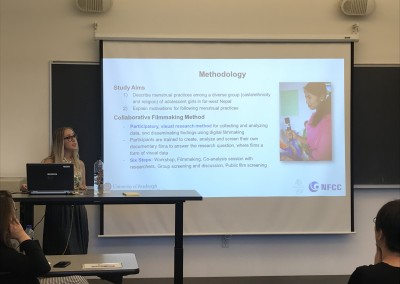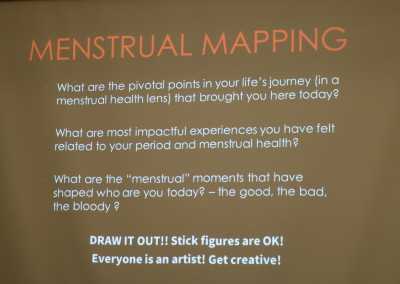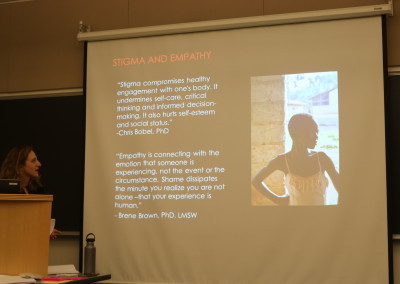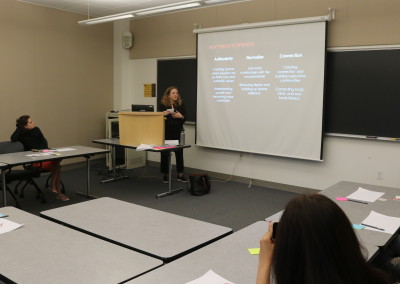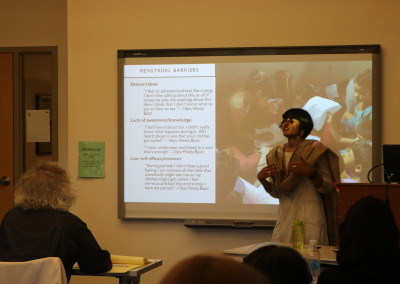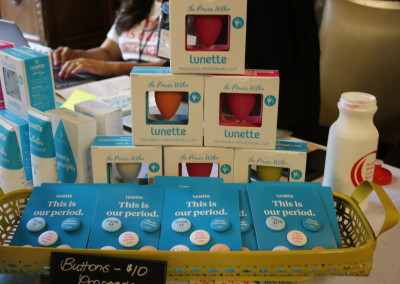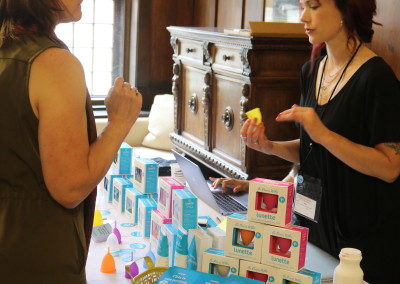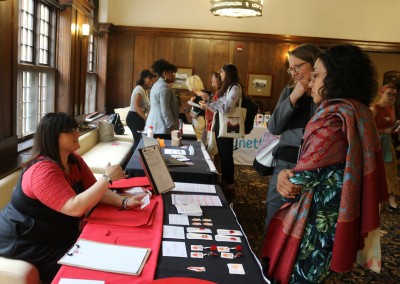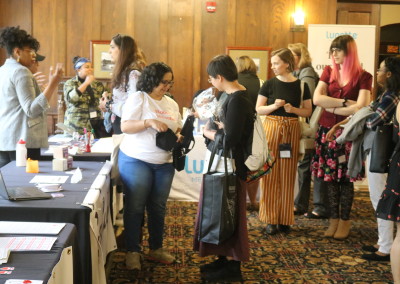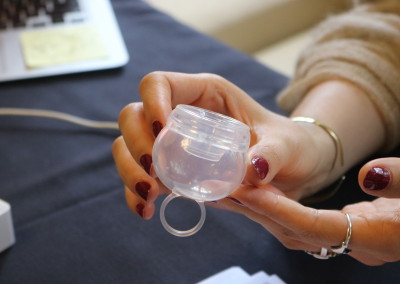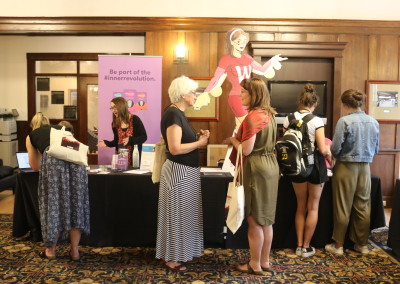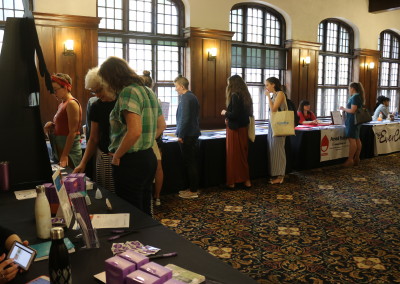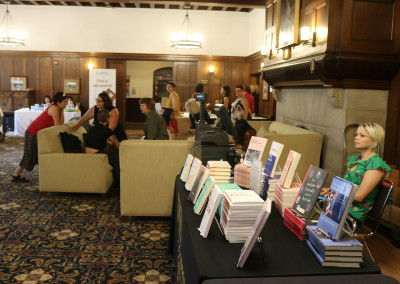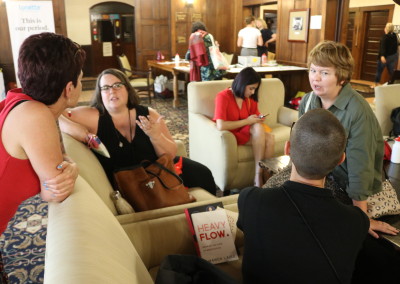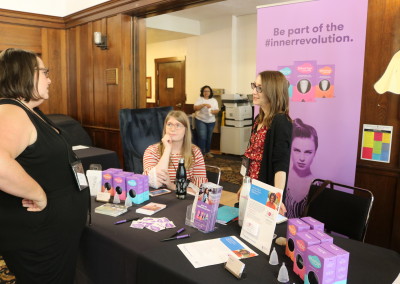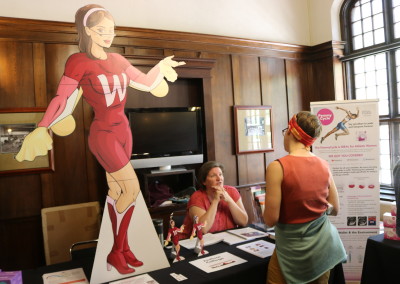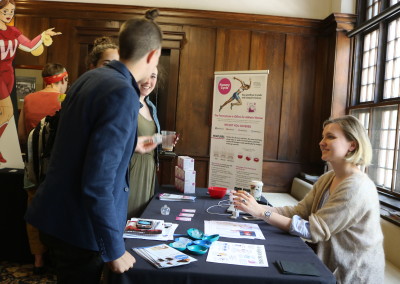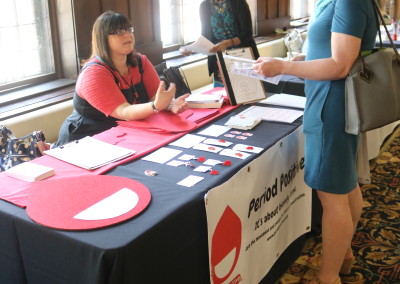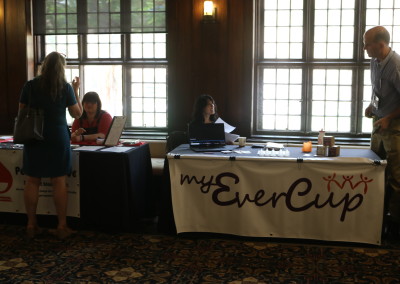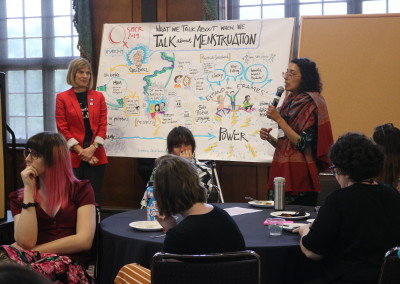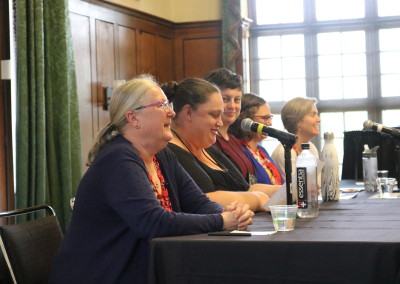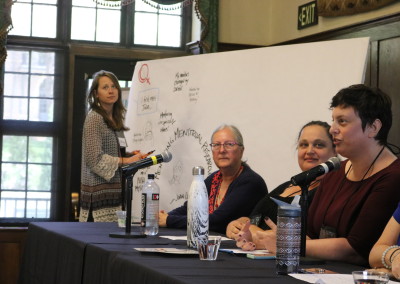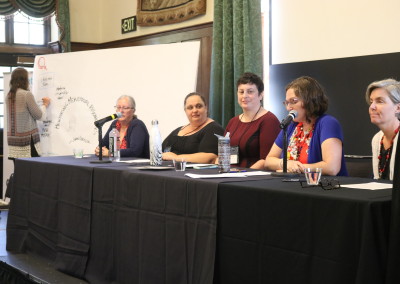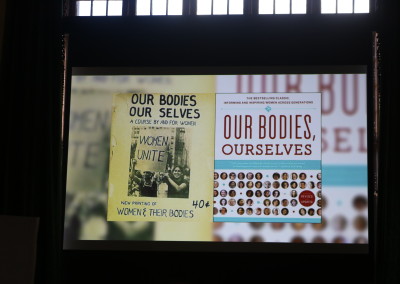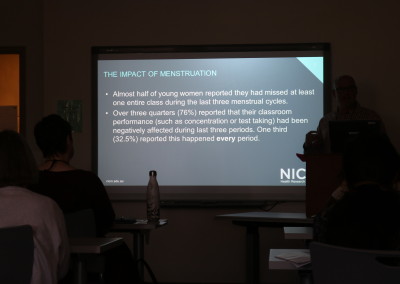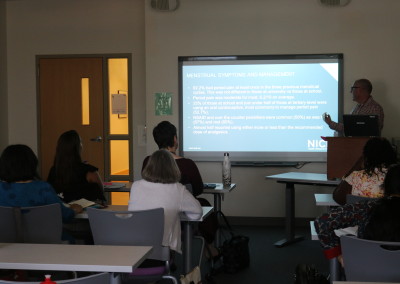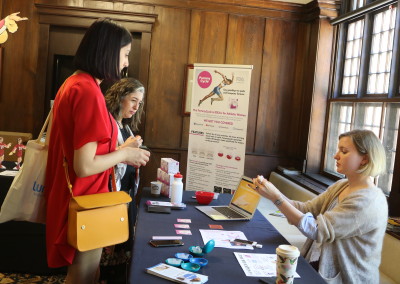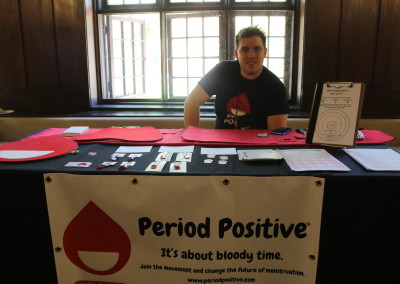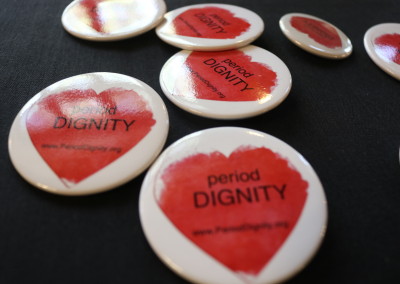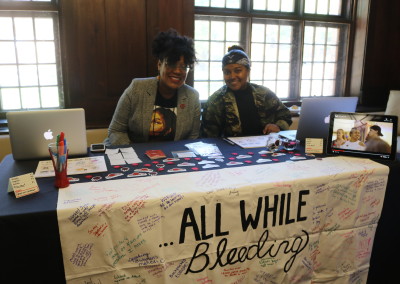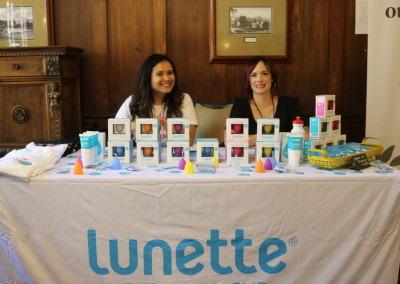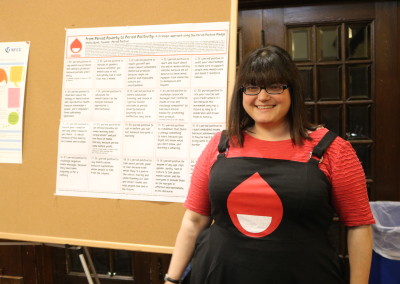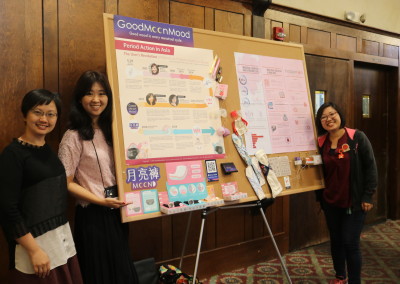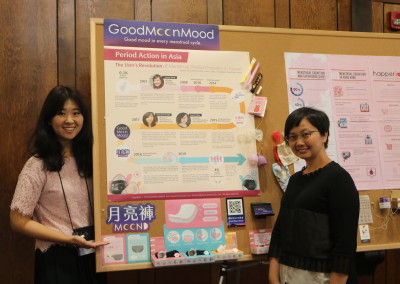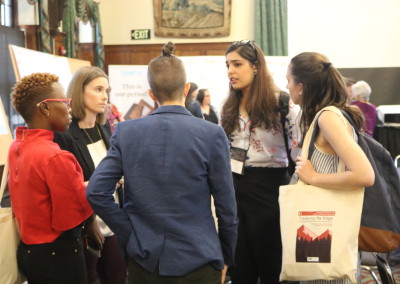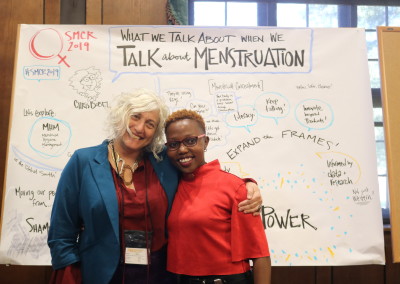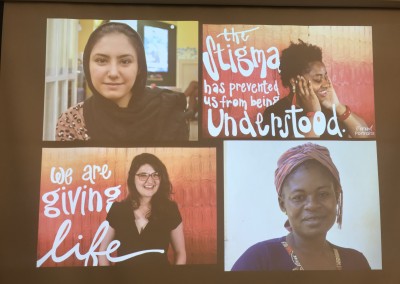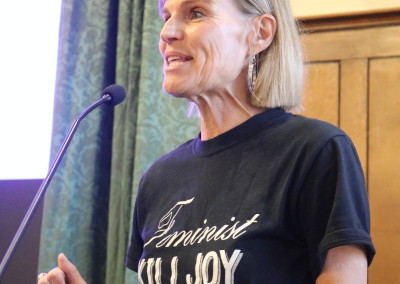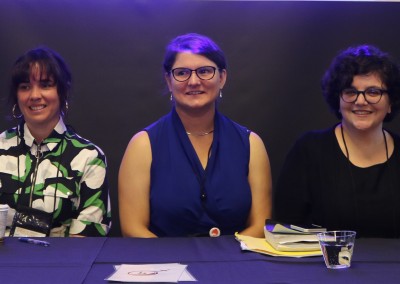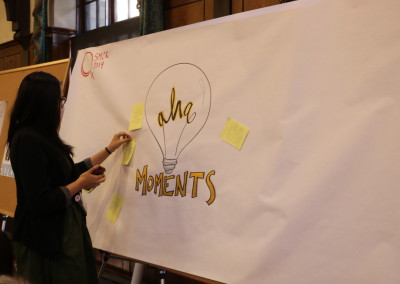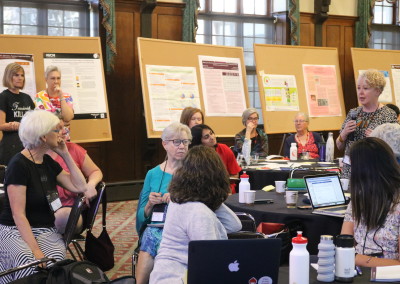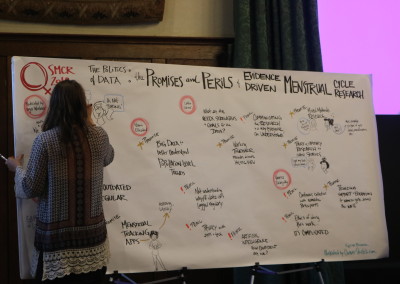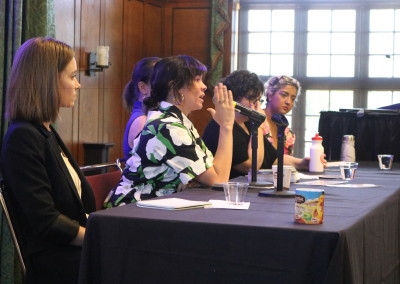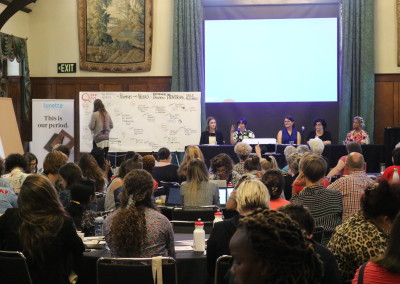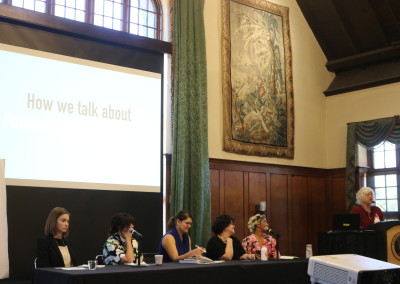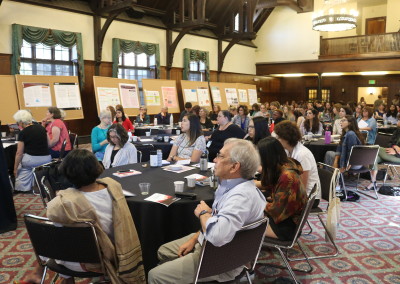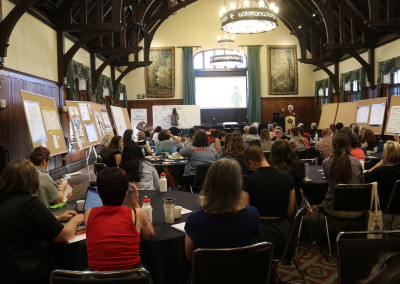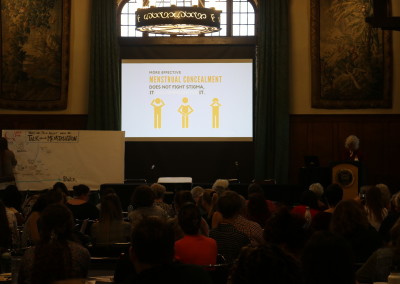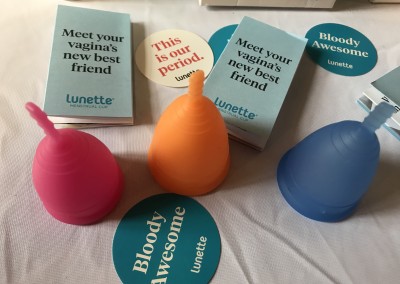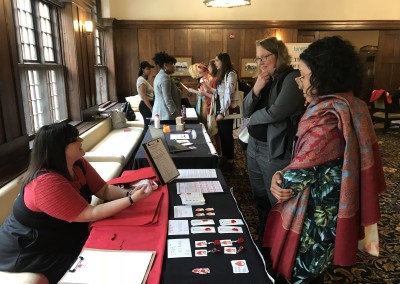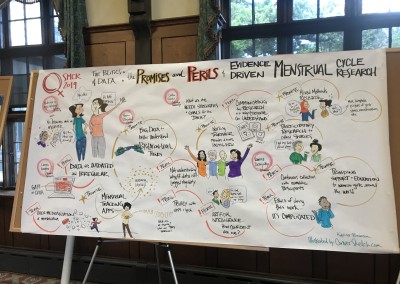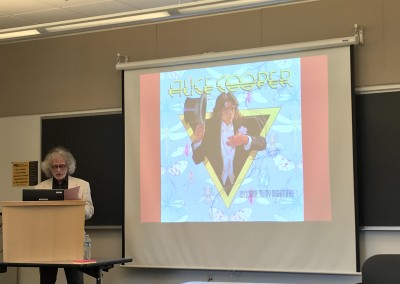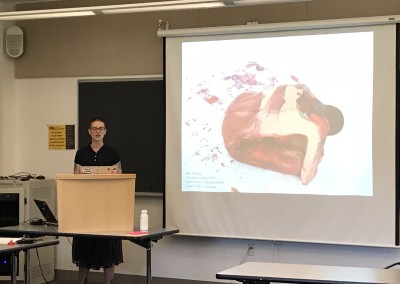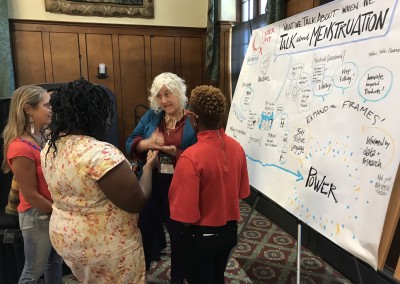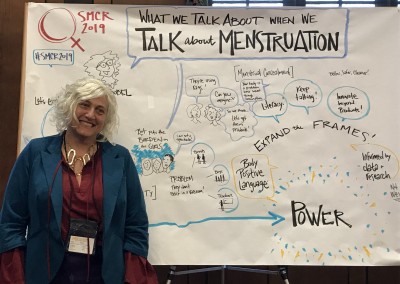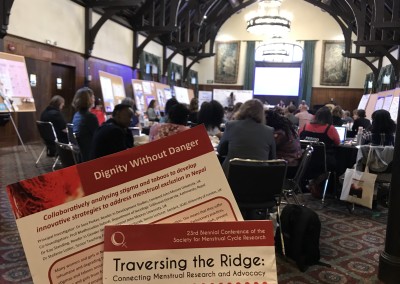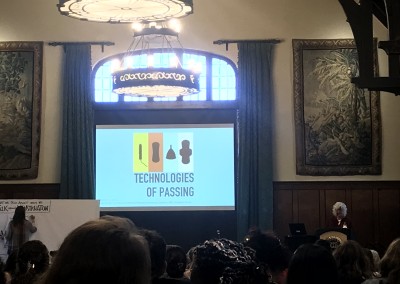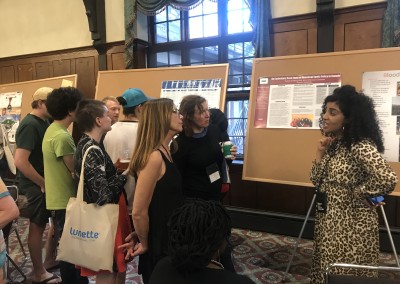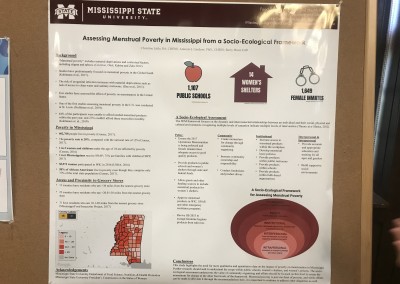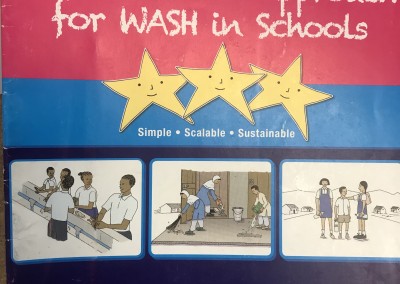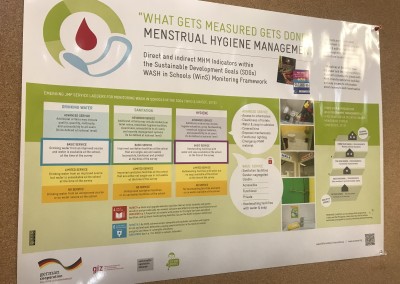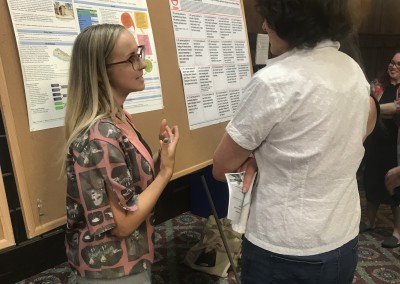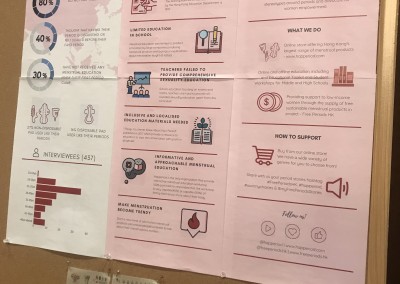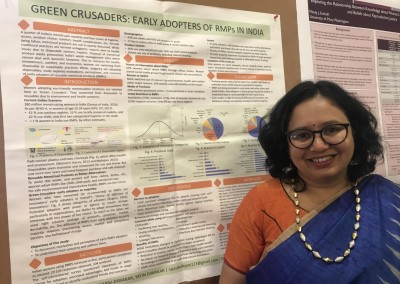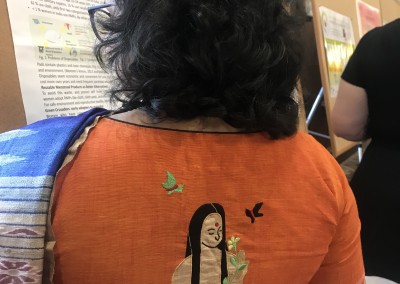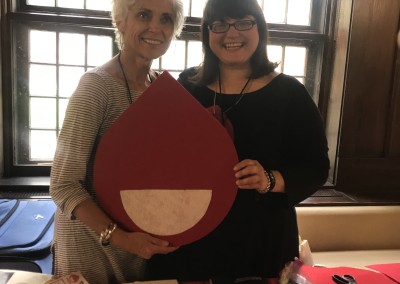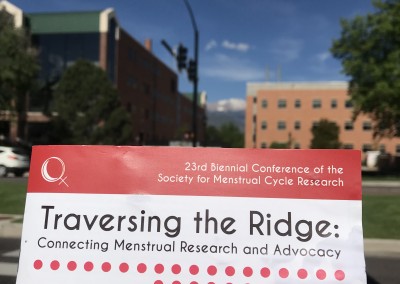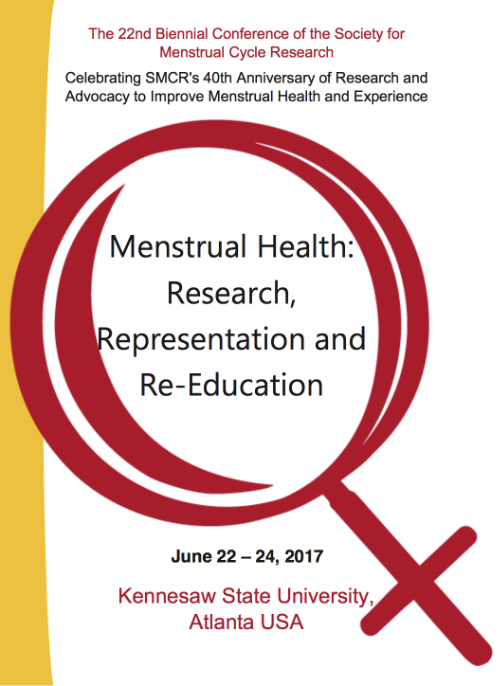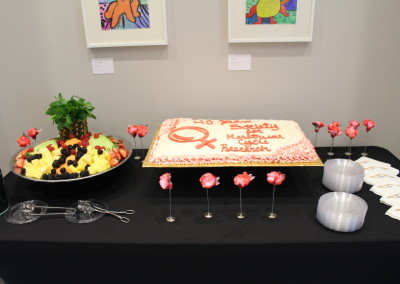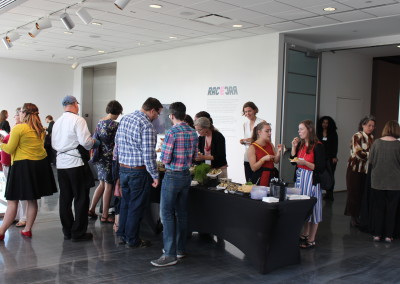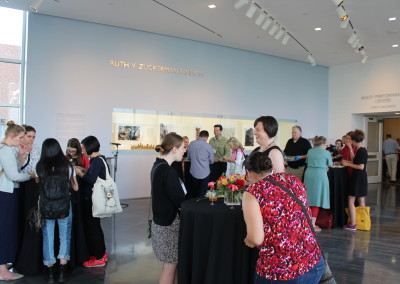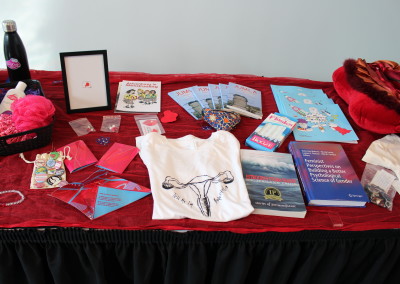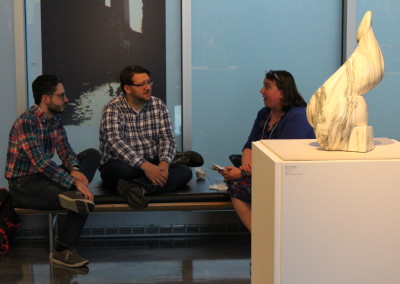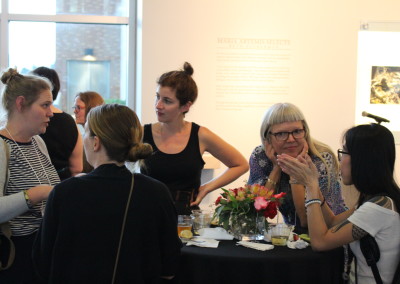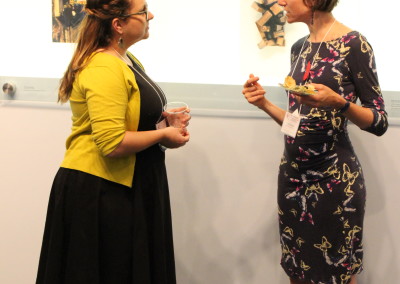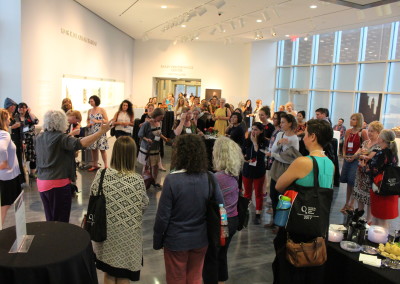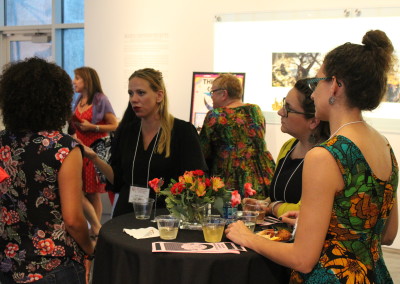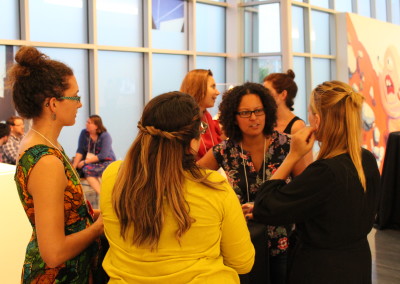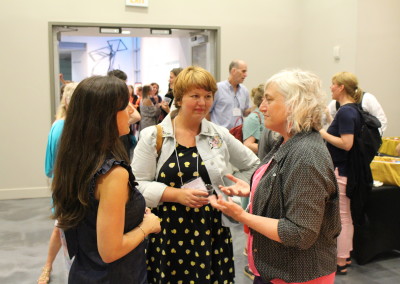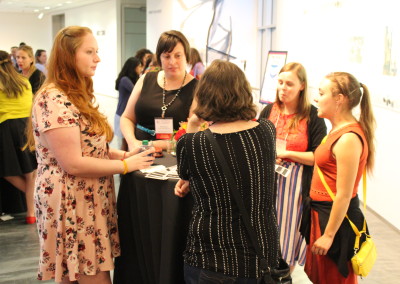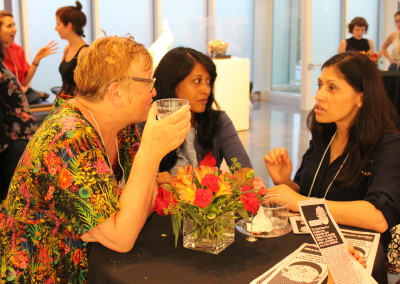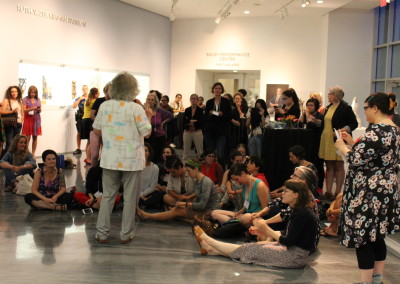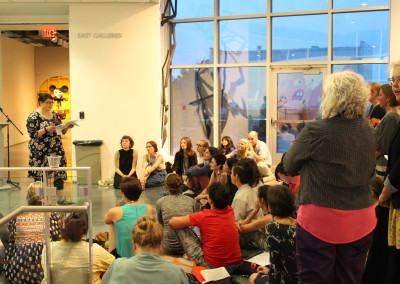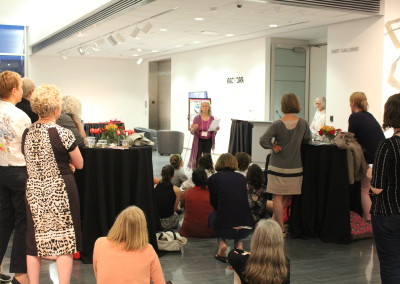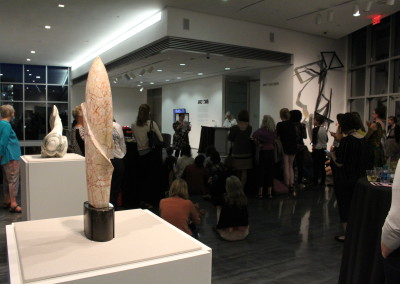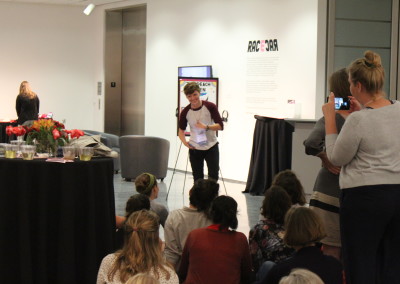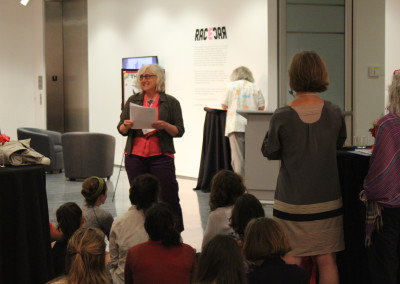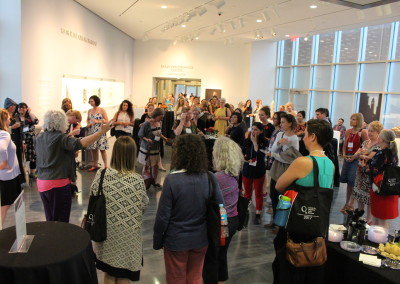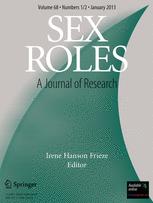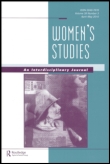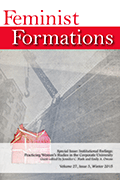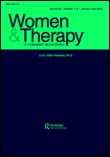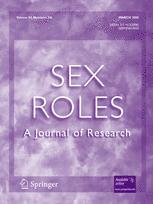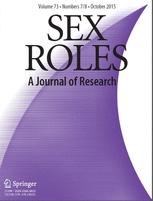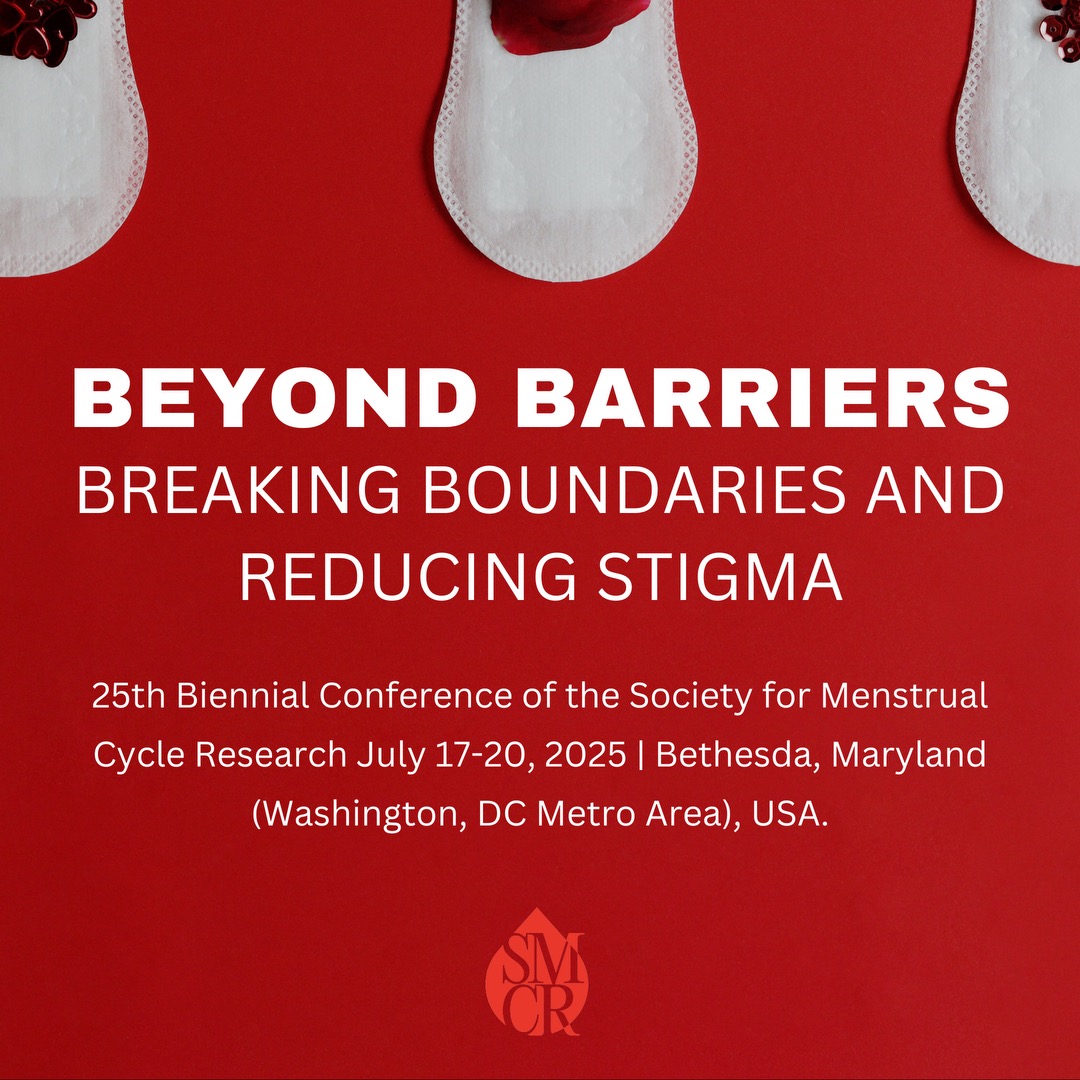
We are excited to announce that the 2025 Society for Menstrual Cycle Research (SMCR) conference will take place from the 17th to 20th of July (Thursday to Sunday). We will be returning to the wonderful Hyatt Regency in Bethesda, Washington DC.
SMCR welcomes researchers, healthcare providers, policymakers, advocates, artists, students, and more to come together, share insights, and inspire change in the menstrual space!
Stay tuned for updates and details by visiting our website and following us on social media:
Call for Papers
Beyond Barriers: Breaking boundaries and reducing stigma
25th Biennial Conference of the
Society for Menstrual Cycle Research
July 17-20, 2025
Bethesda, Maryland (Washington, DC metro area), USA
I am honoured to be chairing the 25th biennial conference of the Society for Menstrual Cycle Research. The SMCR Conference has showcased cutting-edge menstrual cycle research over the last 50 years, covering the broadest range of topics from periods, PMS, menopause, and other aspects of sexual and reproductive embodiment. Our location in the Washington, DC metro area has inspired our theme: Empowering Voices, Shattering Stigma. We welcome presenters and attendees who share our passion for menstrual cycle research, activism, and advocacy to come and join us at this event, to speak, listen, learn, network, and be inspired.
Janette Perz, SMCR President and 2025 Conference Chair
With the theme of “Beyond Barriers: Breaking boundaries and reducing stigma,” we embrace an interdisciplinary, feminist approach to research and advocacy as we bring together our efforts to improve menstrual and reproductive health and justice as they relate to overall well-being.
To highlight current research, advocacy, and to identify future work to be done, our 2025 conference welcomes participation from:
- researchers
- scholars and academics
- health care professionals and clinicians
- public policy advocates
- NGOs and international agencies
- public health and school educators
- writers and artists
- students and interns
- advocates and activists
- others interested in the menstrual cycle, reproductive and sexual health
In 2025, building on the successful format of the 2023 conference, most presentations will be delivered in a plenary format. This approach will allow all attendees to engage with your work and participate in meaningful discussions. Although we are still in the planning stages, we aim to include speed mentoring sessions, a book slam, and the lively Red Moon Howl poetry slam.
Presentations: Please consider submitting proposals for presentations that relate to one or more of the topics listed below. However, if your work addresses another topic, don’t hesitate to submit a proposal to present that work. There are opportunities that will showcase the expansive nature of the SMCR scholarship, advocacy, and reach.
Below are some suggestions that you might consider as you frame your submission, but this is by no means an exhaustive list:
- Evidence-based policy work
- Menarche, menstruation, and menopause activism and research on activism
- Menarche-, menstruation-, and menopause-related health, illness, function, dysfunction, and well-being (such as ovulation, fertility, endometriosis, reproductive cancers, PCOS, perinatal period)
- Menstrual and reproductive health across locations both global and local
- Menstrual and reproductive health needs of underserved populations, including those who are sexuality and gender diverse, disabled or living with a chronic illness, or migrants and refugees
- Menstrual and reproductive health education
- Intergenerational experiences
- Menstruation and economics/capitalism
- Menstrual resistance, art, and aesthetics
- Translation of research and advocacy or activism
- Broadening of reproductive health and justice
- Differing types of advocacy such as education, law, politics, writing, and public presence
We want to be able to highlight the diverse array of work from people doing myriad types of menstrual cycle work, striving to organize around plenary sessions as much as possible. Given this, preference will be given to oral paper and poster proposals.
Oral Paper proposals: are for individual, brief oral presentations that will be grouped thematically in sessions as space allows.
Poster presentations: are formats that allow for extended discussion of the presentation with the author(s).
There will be a limited number of programming slots for other types of proposals:
Roundtables: are discussions that focus on a specific topic or theme that could include, but are not limited to, debates on syllabi, jobs and the market, different types of advocacy, vulnerable populations, or issues of translation. This style works best for open discussion and should include audience participation, as well.
Panel/symposium proposals: are theme-based oral sessions consisting of three to four presentations. Presentations should be organized around a clear theme/topic, and information about all talk, presenters, and the order of the talks need to be included with the submission. Submissions should also name a session chair and, optionally, a discussant.
Workshops: are intended as training and/or information sessions. Submissions should include the workshop title, the problem or expertise addressed, an outline of the proposed content, any specific “take-aways” participants should expect, and the time allotment desired. Workshops are generally scheduled pre-conference.
Abstracts should be submitted by Friday 21 February 2025. Posters will be accepted on a rolling basis until April 31, 2025. Presenters will be normally limited to one first author presentation in order that we can feature as many presenters with diverse offerings as possible. Paper or Symposium proposals may be accepted conditionally as posters.
We look forward to seeing you in July, 2025!
Conference Registration Fees – Early Bird Rates until April 30, 2025
SMCR Member rates
Tier 1: Institution/ employer support = $650
Tier 2: Regular rate = $490.00
Tier 3: Students or limited means (e.g., not employed) = $225
Non-member rates
Tier 1: Institution/ employer support = $820
Tier 2: Regular rate = $620
Tier 3: Students or limited means (e.g., not employed) = $305
We are excited to announce that the 2025 Society for Menstrual Cycle Research (SMCR) conference will take place from the 17th to 20th of July (Thursday to Sunday). We will be returning to the wonderful Hyatt Regency in Bethesda, Washington DC.
SMCR welcomes researchers, healthcare providers, policymakers, advocates, artists, students, and more to come together, share insights, and inspire change in the menstrual space!
Stay tuned for updates and details by visiting our website and following us on social media:
Call for Papers
Beyond Barriers: Breaking boundaries and reducing stigma
25th Biennial Conference of the
Society for Menstrual Cycle Research
July 17-20, 2025
Bethesda, Maryland (Washington, DC metro area), USA
I am honoured to be chairing the 25th biennial conference of the Society for Menstrual Cycle Research. The SMCR Conference has showcased cutting-edge menstrual cycle research over the last 50 years, covering the broadest range of topics from periods, PMS, menopause, and other aspects of sexual and reproductive embodiment. Our location in the Washington, DC metro area has inspired our theme: Empowering Voices, Shattering Stigma. We welcome presenters and attendees who share our passion for menstrual cycle research, activism, and advocacy to come and join us at this event, to speak, listen, learn, network, and be inspired.
Janette Perz, SMCR President and 2025 Conference Chair
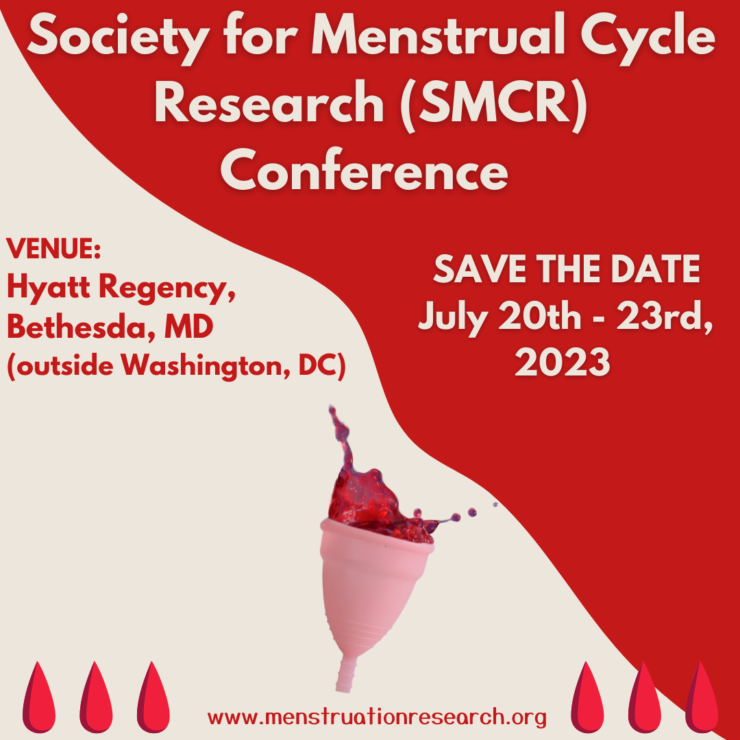
Omisade Burney-Scott
“For Lucy, Arnacha, and Betsy: Why Reproductive Justice Matters”

Omisade Burney-Scott (she/her) is a Black southern 7th generation native North Carolinian feminist, social justice advocate and creative with decades of experience in nonprofit leadership, philanthropy, and social justice. Omisade works with leaders who want to strengthen their organizational culture and capacity, adopt a Healing Justice praxis and structural supports, and/or deepen their Reproductive Justice work.
Omisade is a sought after, nationally recognized speaker whose energy and authenticity have captivated listeners and readers from Forbes to Ms Magazine and Good Housekeeping Magazine. She teaches us that menopause is a privilege and that for women of color, menopause is different. She says: “I think menopause is a portal to the next iteration of yourself. We’re still emergent; it doesn’t matter how old you get, there is no shelf life on being emergent. Menopause is one of those portals that we kind of enter into that’s unchartered territory. When we emerge on the other side, we are absolutely transformed.” (Omisade Burney-Scott).
Omisade is the creator and curator of the Black Girl’s Guide to Surviving Menopause (BGG2SM). BGG2SM was created to counterbalance prevalent harmful narratives and a lack of resources. BGG2SM is a multidisciplinary initiative focused on cultural organizing, narrative shift work, and advocacy to normalize menopause and aging for Black women-identified and gender-expansive people.
Margaret E. Johnson
“The Period is Political: Menstrual Justice, Abortion Rights & Reproductive Justice”

Margaret E. Johnson is a Professor of Law and Co-Director of the Center on Applied Feminism at The University of Baltimore School of Law in the United States.
Professor Johnson’s scholarship focuses on the intersection of menstruation, law, and policy, having published numerous law review and other articles, including Menstrual Justice and Title IX and Menstruation. She has participated in advocacy campaigns for period product provision in jails, prisons, and schools in Maryland; accommodations and modifications for menstruating standardized test takers as co-founder of MP and the Bar; and amendments to federal law to include discrimination based on menstruation and menopause as sex discrimination. She is on the expert panel for the new Our Bodies Ourselves Today, Menstruation to Menopause vertical.
She is a 2023 Fulbright Scholar at the University Technology Sydney, Australia researching comparative menstruation-related law and policy.
Professor Johnson has received several awards for her scholarship, teaching, and service, including being named one of the Top 25 Women Professors in Maryland and receiving the USM Board of Regents’ Faculty Award for Public Service. Johnson is a graduate of Wisconsin Law School, cum laude, and Dartmouth College.
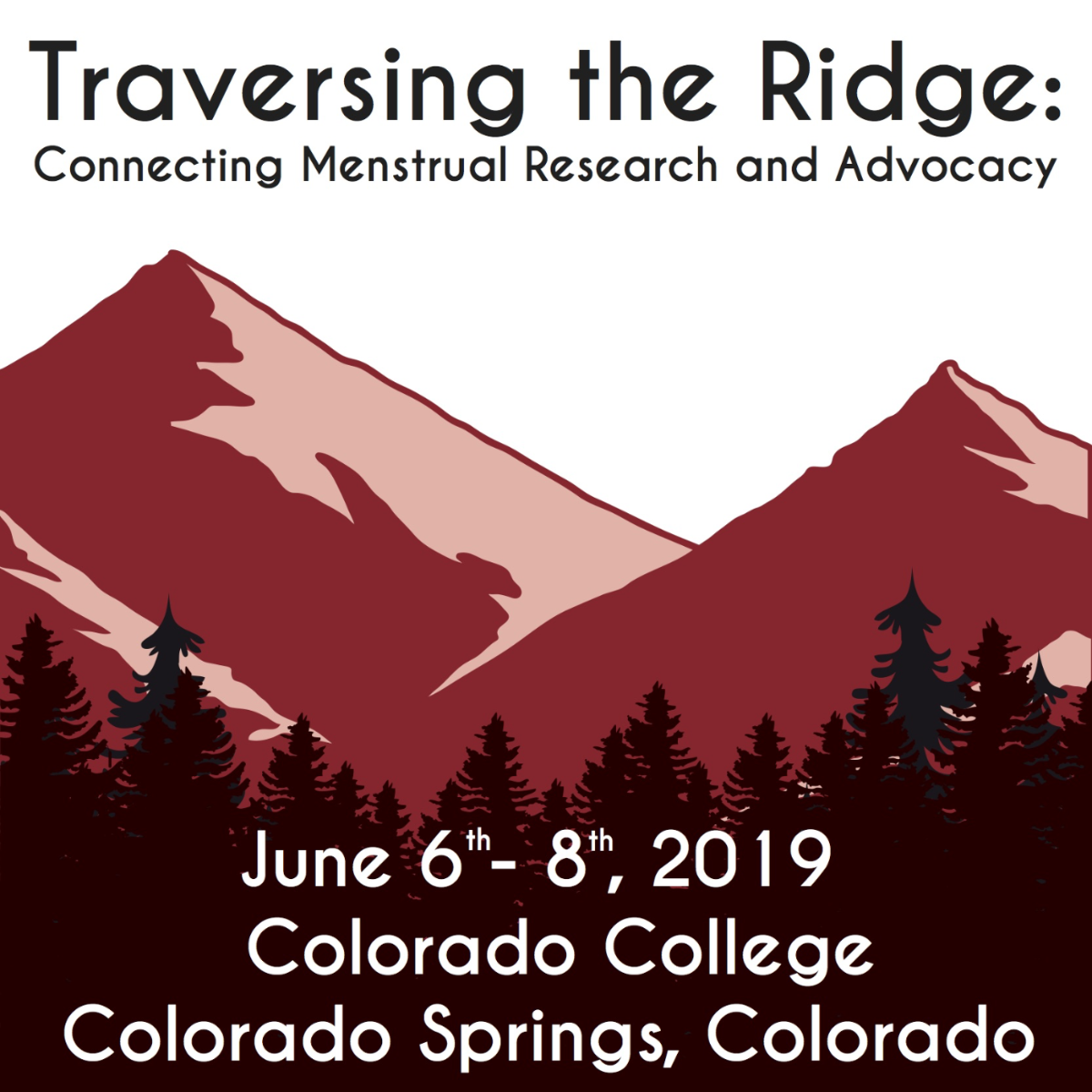
– Tomi-Ann Roberts, SMCR President and 2019 Conference Chair
People
Countries
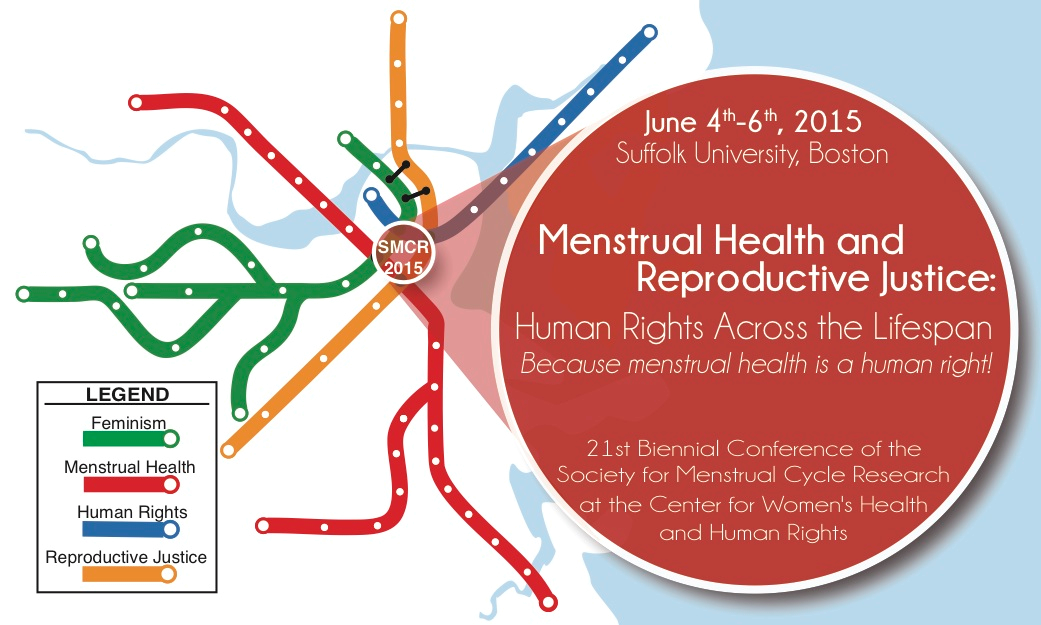
Those who missed the conference and would like to learn more about individual sessions can view the complete conference program here (with undying gratitude to Jax Gonzalez). We encourage you to contact individual scholars for more information about their work.
Selected highlights from the Poetry Open Mic and Raffle have been posted throughout the summer at SMCR’s blog, Menstruation Matters.
Thanks to our sponsors and conference organizers.

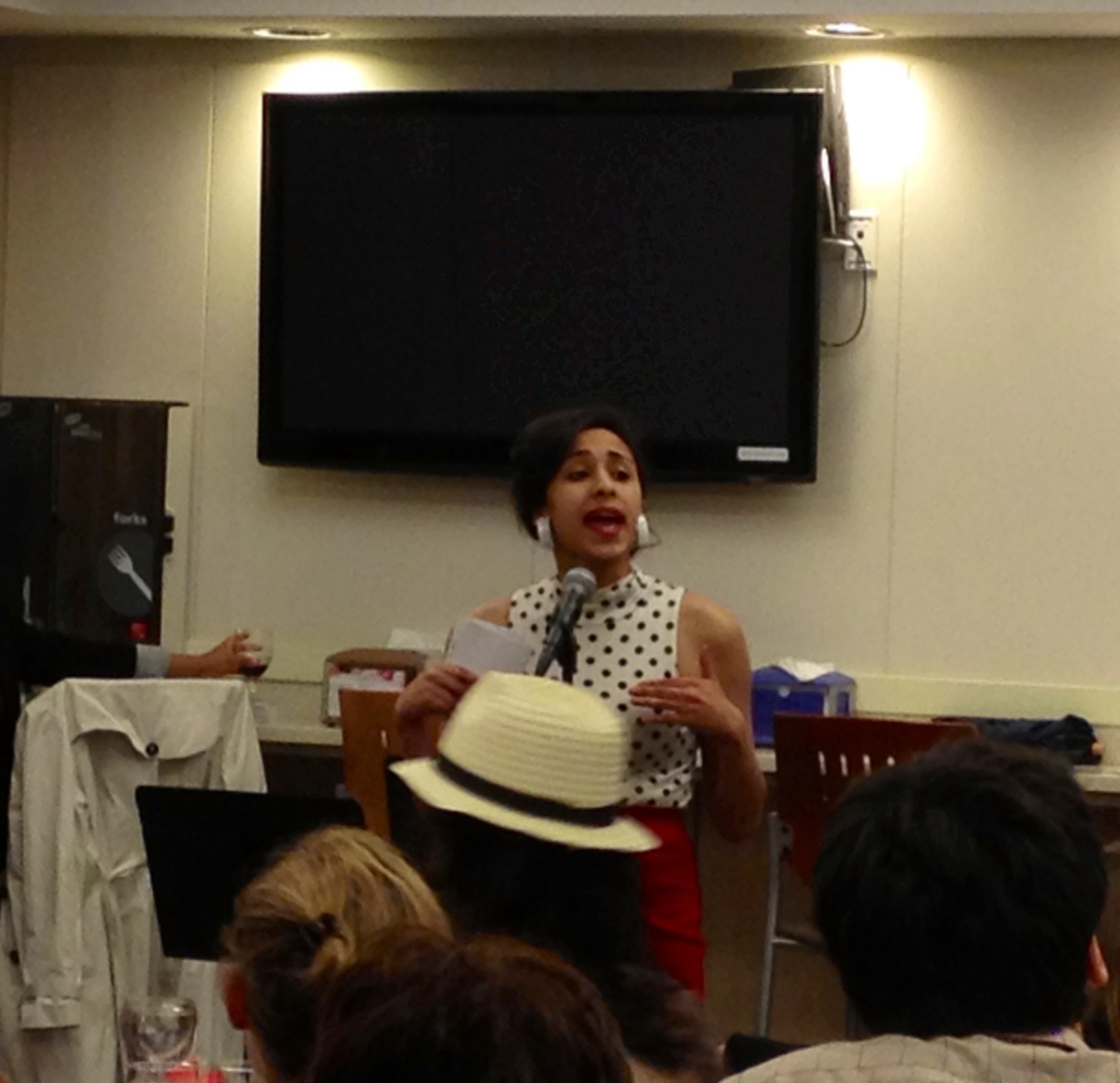
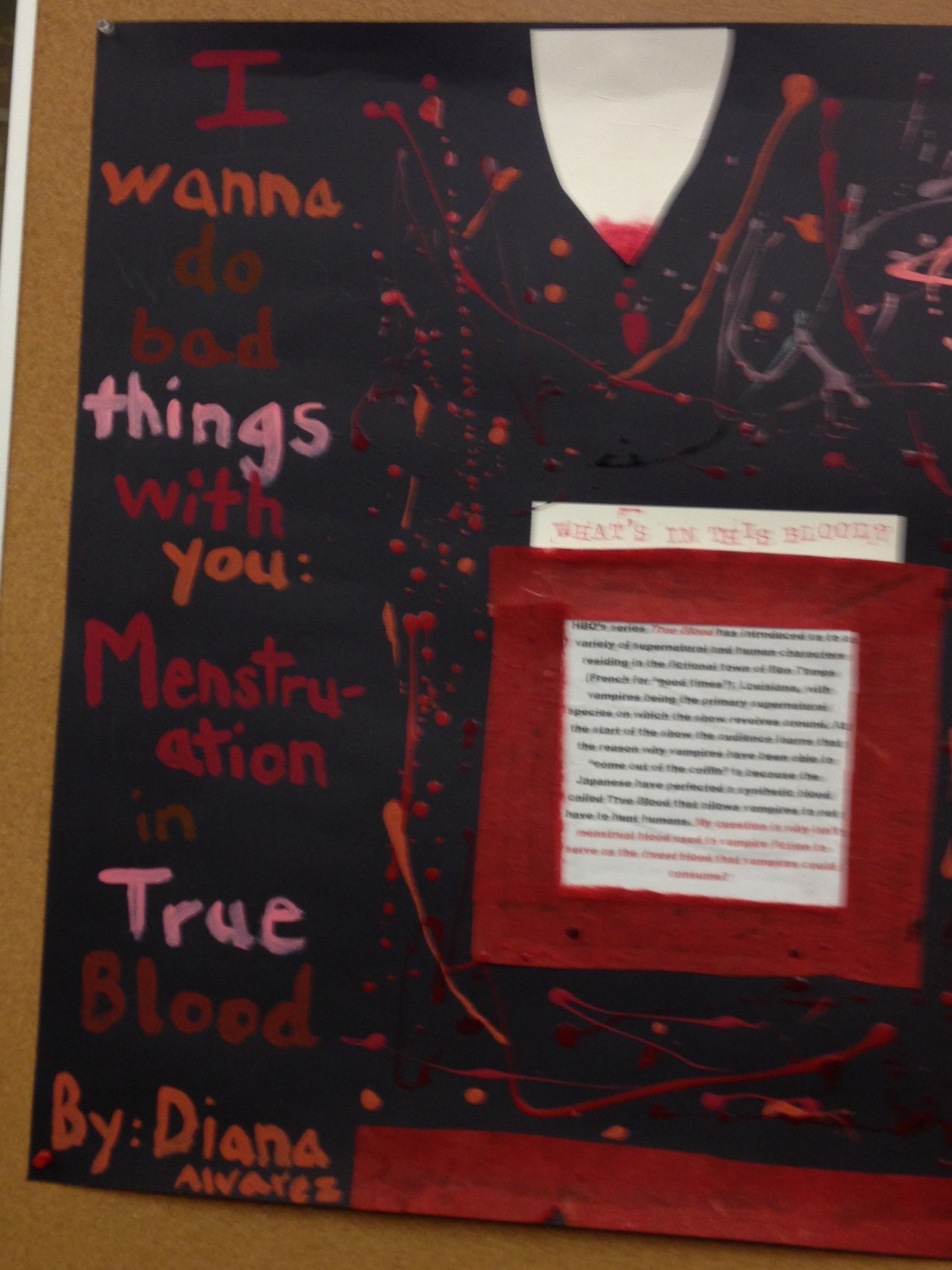
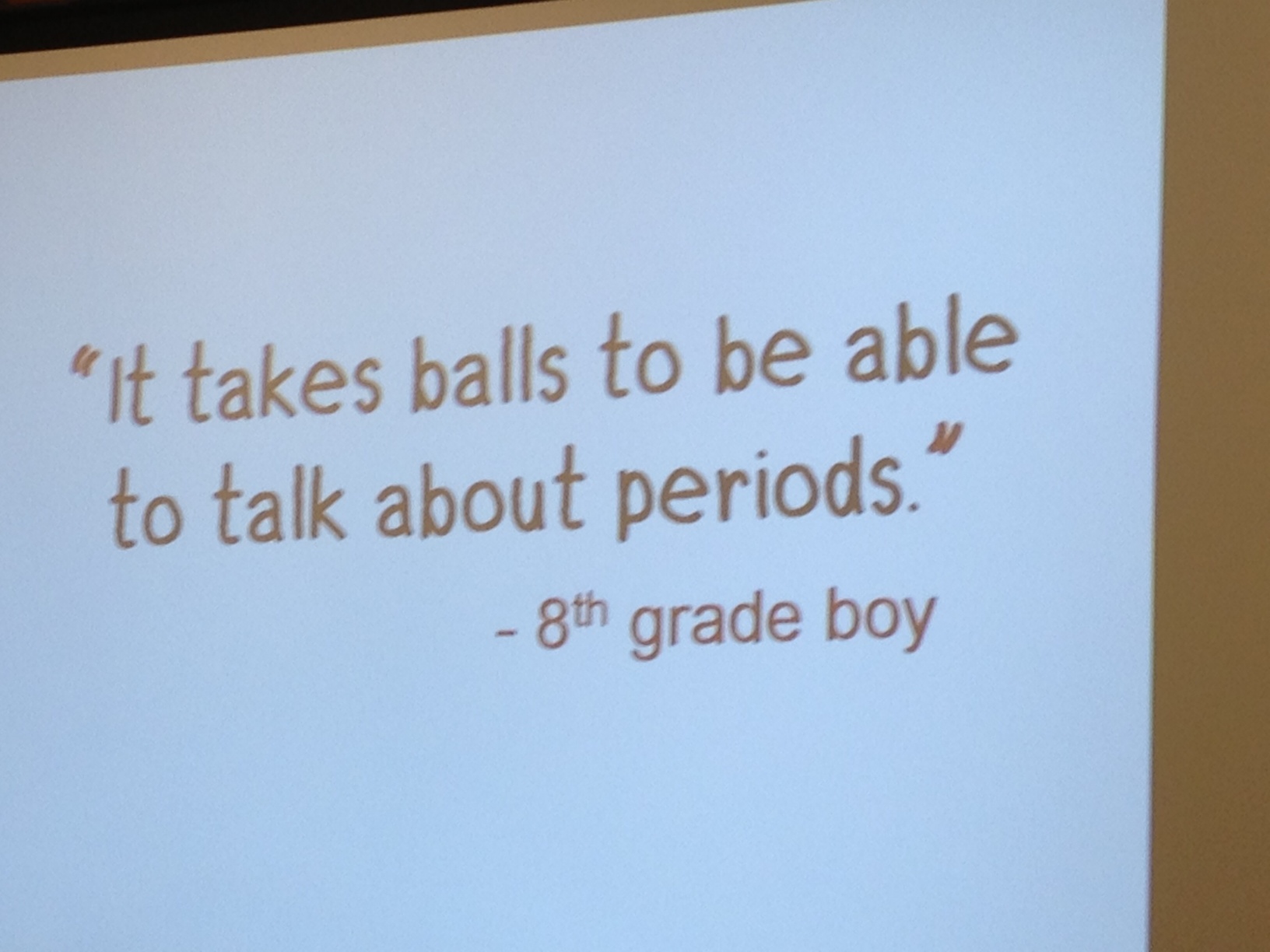
Archived Video Streams of 2011 Conference @ Chatham University
Friday morning, June 3
In 2011, meetings of the Society for Menstrual Cycle Research were available on live video feed. Those videos have been archived, and can now be viewed here. The videos are divided over three pages for faster downloading; this page contains presentations from the morning of Friday, June 3.
To locate particular presentations or speakers, or to identify the speakers in the videos, the conference program is available as a PDF file.
1980 The Menstrual Cycle, Volume I: A Synthesis of Interdisciplinary Research edited by Alice J. Dan, Effie A. Graham & Carol P. Beecher
1980 The Menstrual Cycle, Volume II: Research and Implications for Women’s Health edited by Pauline Komnenich, S.N. Elder, M. McSweeney & J.A. Novak
1982 Changing Perspectives on Menopause edited by Ann M. Voda, Myra Dinnerstein & Sheryl R. O’Donnell
1983 Menarche: The Transition from Girl to Woman edited by Sharon Golub
1986 Culture, Society and Menstruation edited by Virginia L. Oleson and Nancy Fugate Woods 1986
1991 Menstruation, Health and Illness edited by Diana L. Taylor and Nancy Fugate Woods

